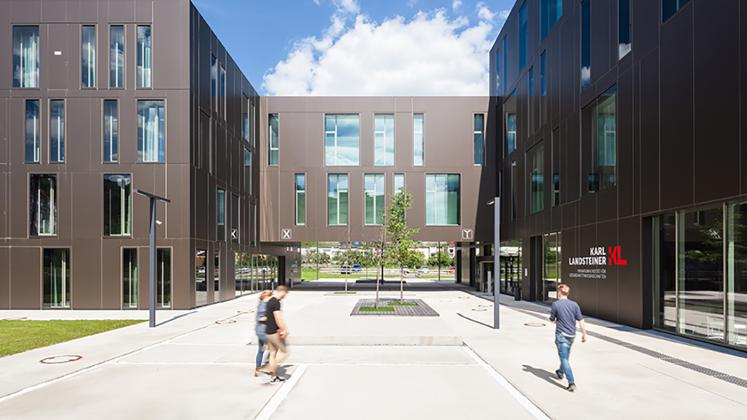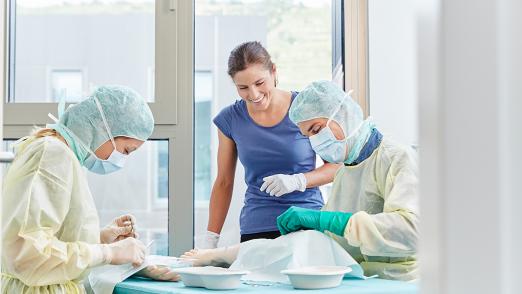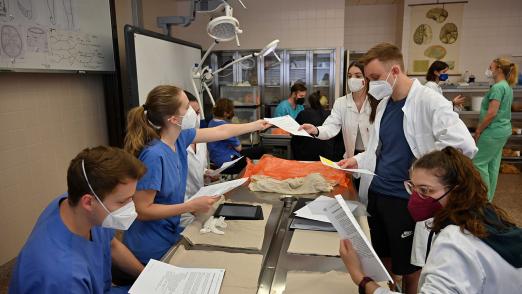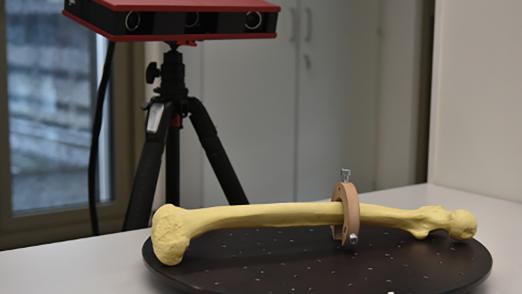
Teaching laboratory
At KL, trainee doctors do not just learn clinical skills. They also receive additional training in laboratory skills through a range of modules held in the KL teaching laboratory. Medical students gain valuable insight into cell culture, molecular biology, microbiology and basic laboratory procedures under the guidance of teachers, tutors and scientists.
Teaching laboratory: Management and organisation
The laboratory manager is primarily responsible for keeping the laboratory running smoothly and for maintaining all the technical equipment. This includes purchasing general laboratory consumables, arranging for repairs and maintenance, and performing the organisational and administrative activities necessary to meet the needs and requirements of the laboratory staff. Laboratory management aims to ensure a work-friendly and safe environment for research activities.
Modules and module components
Course director:
- Maga Ursula Föger-Samwald, PhD
Programme Director Bachelor Medical Science
Participants:
- Karen Zuser, MSc
Operational Management Teaching Laboratory, Department of Water Quality and Health - Arno Bindlechner, BSc
Chemical Technical Assistant, Department of Water Quality and Health
Course content:
The practical course “BM01.02 Basic Lab works”, which is part of the module BM01 “Basics of Medical Science”, will familiarise students with safety rules in the laboratory and with basic laboratory procedures such as handling pipetting aids, preparing chemical solutions and measuring the pH value of a solution. Students will prepare blood cell suspensions in buffer solutions at different concentrations. This will help them understand the important role that buffers and ion concentrations play in physiological processes and when conducting laboratory experiments.
Course director:
- Maga Ursula Föger-Samwald, PhD
Programme Director Bachelor Medical Science
Participants:
- Professor Dana Mezricky
IMC University of Applied Sciences Krems, Professor at the Department of Life Sciences - Professor Dr Christoph Wiesner
IMC University of Applied Sciences Krems, Professor at the Department of Life Sciences - Helmut Schweiger, MSc
IMC University of Applied Sciences Krems, Group Leader Method Development/Validation at the Institute Krems Bioanalytics - Associate Professor Dr Martin Knöfler
Department of Obstetrics and Gynecology, Medical University of Vienna - Associate Professor Dr Wolfgang Mikulits
Head of Research Centre “Progression and Metastasis of Tumours”, Medical University of Vienna
Course content:
The practical course “BM03.03 Introduction to Molecular and Cellular Laboratory Techniques”, which is part of the module BM03 “From Cell to Organism”, presents basic modern molecular and cellular laboratory techniques. Previously acquired theoretical knowledge of molecular and cell biology will be applied in practice by performing an enzyme kinetics experiment and basic cell cultivation methods, particularly the passage of cells. A Western blot and immunoblot experiment will also be performed to monitor an important signalling pathway in cancer cells.
Course director:
- Maga Ursula Föger-Samwald, PhD
Programme Director Bachelor Medical Science
Participants:
- Dipl.-Ing. Dr Claudia Kolm
Research Associate (PostDoc), Department of Water Quality and Health - Bernhard Moser, PhD
Research Associate (PostDoc), Department of Pharmacology - Mats Leifels, PhD
Research Associate (PostDoc), Department of Water Quality and Health
Course content:
The practical course “BM05.03 Introduction to Methods for the Analysis of Cellular Systems”, which is part of the module BM05 “Molecular control”, teaches students the essential principles of different molecular biological methods (RT-qPCR + ELISA) using the example of a practical experiment for the quantitative detection of the cellular inflammatory response in monocyte cells. Students will acquire all the necessary basics to be able to detect and quantify the altered gene expression of certain cytokines in response to the putative infection at different levels of gene expression (mRNA vs. protein level) on the basis of a simulated infection of human monocytes with a bacterial pathogen. Students will learn fundamental principles that will enable them to understand and interpret laboratory findings and academic publications in their future work as medical practitioners.
Course director:
- Univ.-Prof. Mag. Dr. Gerald Obermair
University Professor, Head of Department of Physiology
Participants:
- Dr Ruslan Stanika
Research Associate (Senior PostDoc), Department of Physiology - Dr Manuel Hessenberger, MSc
Research Associate (PostDoc), Department of Physiology - Dr Clarissa Eibl, MA
Research Associate (PostDoc), Department of Physiology
Course content:
The practical course “BM06.02 Renal Physiology”, which is part of the module BM06 “Homeostasis”, will provide students with an understanding of how extracellular fluids (water and electrolyte balance) and all renal functions are regulated. Students will be familiarised with renal functions, ranging from excretory mechanisms to the kidney’s involvement in important hormonal feedback loops, thereby expanding their knowledge of this organ in the context of the physiology of the body as a whole. Particular attention will be paid to the mechanisms of urine concentration and autonomous and humoral regulation of renal function, especially with regard to the long-term regulation of extracellular fluid composition, blood volume, and blood pressure. Students will also learn about the role of the kidney as an endocrine organ (erythropoietin, vitamin D, control of calcium and phosphate homeostasis). The most important kidney diseases will be discussed in the context of normal and abnormal kidney function. Students who have successfully completed the course will be able to explain the basic principles of substance excretion and understand the sections of the renal tubular system in relation to exemplary substance excretion/reabsorption (e.g. water, sodium, potassium, glucose).
Course director:
- Professor Andreas Farnleitner, MSctox
University Professor, Head of the Department of Water Quality & Health - Senior physician Dr Barbara Ströbele
University Hospital St. Pölten, Clinical Institute for Hygiene and Microbiology
Participants:
Participants:
- Associate Professor Alexander Kirschner
Associate University Professor, Deputy Head of the Department of Water Quality & Health - Dipl.-Ing. Dr Claudia Kolm
Research Associate (PostDoc), Department of Water Quality and Health - Dr Ildiko-Julia Pap
Senior physician, University Hospital St. Pölten, Clinical Institute for Hygiene and Microbiology - Carmen Rehm, MSc
PhD student, Department of Water Quality and Health - Melanie Leopold, MSc.
PhD student, Department of Water Quality and Health - Sophia Steinbacher, MSc.
PhD student, Department of Water Quality and Health - Karen Zuser, MSc
Operational Management Teaching Laboratory, Department of Water Quality and Health - Arno Bindlechner, BSc
Chemical Technical Assistant, Department of Water Quality and Health
Course content:
The module BM10 Microbiology and Hygiene will provide the basic knowledge needed by doctors and health scientists to understand the complex interactions between the microbial realm and human health. The module will also familiarise students with the essential principles of hygienic measures and strategies to prevent and control the spread of infectious diseases. Microorganisms and viruses are of the most fundamental significance for human health and disease and display numerous positive and negative interactions. Recent research findings are providing increasing evidence of the positive role of the human microbiome for human well-being. On the other hand, many microbes and viruses are known to be obligate pathogens responsible for the occurrence and spread of infectious diseases in the human population in environmental and clinical settings. The practical laboratory courses will present and apply the most important diagnostic methods of microbiology and hygiene. The practical laboratory courses will introduce students to the most important diagnostic methods in microbiology and hygiene and how to apply them. The goal of the laboratory exercises is also to enable students to understand microbiological laboratory findings and to interpret them correctly.
Course director:
- Professor Andreas Farnleitner, MSctox
University Professor, Head of the Department of Water Quality & Health
Participants:
- Associate Professor Alexander Kirschner
Associate University Professor, Deputy Head of the Department of Water Quality & Health - Dipl.-Ing. Dr Claudia Kolm
Research Associate (PostDoc), Department of Water Quality and Health - Carmen Rehm, MSc
PhD student, Department of Water Quality and Health
Course content:
Good water quality is essential for human health in all areas of life. According to the World Health Organisation (WHO), unsafe water and lack of sanitation is responsible for up to 10% of global damage to health, especially in developing regions. This elective module will provide students with a basic understanding of microbiological water quality and health issues and expand the skills acquired from BM10 (Microbiology and Hygiene) to prevent the spread of infectious diseases via the water cycle (in natural and technical systems). The module focuses on practical training and exchange in a setting that is both scientific and concrete. Students will acquire the required knowledge by means of the following tools: (i) theoretical introduction, (ii) laboratory demonstration of analytical/diagnostic tools, (iii) one-day field trip to a drinking water supplier and/or a wastewater treatment plant, (iv) laboratory analysis of the collected samples and interpretation of the results, (v) further reading of selected literature on model pathogens, (vi) presentation of the results (including interpretation/discussion).
Course director:
- Professor PD Dr Dagmar Stoiber Sakaguchi
University Professor, Head of the Department of Pharmacology
Participants:
- Agnieszka Witalisz-Siepracka, PhD
Research Associate (PostDoc), Department of Pharmacology
Course content:
The Department of Pharmacology engages in basic research in the field of cancer research. This elective module aims to provide students with an introduction to experimental scientific work in this field. Our research group will present methods and techniques that are often used in medicine-related disciplines such as molecular biology, immunology and biochemistry in the laboratory, and the students will try them out themselves. The course will also include regular presentations of interim and final results with trouble shooting exercises, and discussions of relevant and new literature in the field. This will offer students an insight into the daily tasks and everyday routine of scientists working in the field of basic research.
Course director:
- Univ.-Prof. Mag. DDr. Klaus Podar
University Professor, Head of Department of Molecular Oncology and Haematology
Participants:
- Private Lecturer Dr Sonia Vallet
Senior Physician for Internal Medicine, Krems University Hospital - Private Lecturer Dr Josef Singer, PhD
Senior Physician for Internal Medicine, University Hospital Krems - Private Lecturer Dr Gudrun Kreye
Senior Physician for Internal Medicine, University Hospital Krems
Course content:
Over the last two decades, basic and translational research have significantly improved outcomes for patients with solid tumours, haematological malignancies and benign haematological diseases. Patient care continues to evolve as new targets are identified, resulting in the development of new therapeutic agents and testing modalities, and as the accumulation of clinical trial data leads to rapid changes in treatment guidelines. Oncologists, haematologists, and other clinicians involved in the treatment of cancer patients have a responsibility to keep abreast of the latest advances in diagnosis, treatment and management. The aim of this elective module in molecular oncology and haematology is to provide students with an insight into the taxonomy of cancer, the methodology of molecular diagnosis, and the molecular signalling pathways that are relevant for therapy. The course places a special emphasis on the pathophysiological effects of the tumour microenvironment. We hope that students in this elective module will share our passion for becoming physician-scientists who focus on implementing newly discovered diagnostic and prognostic methods, as well as rationally derived new therapies, to ultimately improve the survival outcomes of our patients.








